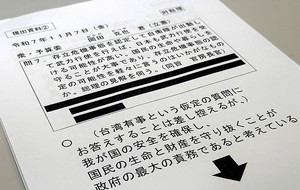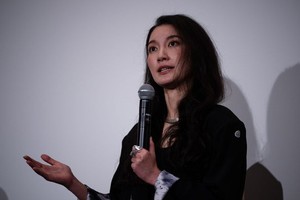THE ASAHI SHIMBUN
November 4, 2022 at 07:00 JST
 Fukushiro Nukaga, left, chief of the Defense Agency, and Yoshikazu Shimabukuro, mayor of Nago, shake hands after they agreed on a new U.S. military base relocation plan on April 7, 2006. (Asahi Shimbun file photo)
Fukushiro Nukaga, left, chief of the Defense Agency, and Yoshikazu Shimabukuro, mayor of Nago, shake hands after they agreed on a new U.S. military base relocation plan on April 7, 2006. (Asahi Shimbun file photo)
NAGO, Okinawa Prefecture--City officials here say no official minutes exist of crucial meetings with the central government over the relocation of a U.S. base in the prefecture, a lapse that may violate Nago's information disclosure ordinance.
An expert well-versed on the U.S. base relocation issue said the revelation is “astonishing,” and that Nago city’s failure to produce official records over such a weighty issue is an “abdication of political accountability.”
The construction of a landfill where a new airfield will be built to replace U.S. Marine Corps Air Station Futenma in Ginowan has been in the works off the Henoko district of Nago, both in the southernmost prefecture, since 2018.
The Asahi Shimbun requested the disclosure of all records of the city government’s decision-making process and discussions between Nago officials and the central government pertaining to a new relocation plan in 2006 under the city's information disclosure ordinance.
In reply, the municipal government said in February that it “did not ever possess relevant records.”
In the initial relocation plan, the central government, Okinawa Prefecture and Nago city all agreed to construct a single runway measuring 2,000 meters on a rectangular-shaped reclaimed parcel off Henoko.
But Tokyo and Washington switched to a new plan to reclaim land off Henoko and Oura Bay in October 2005 following the realignment of U.S. forces in Japan.
The shift sparked anger in the Okinawa prefectural government and Nago city government as it was adopted without their consent.
In January 2006, new Nago Mayor Yoshikazu Shimabukuro, who was elected that month, initially expressed opposition to the revised plan.
But he dropped his objection after holding many talks with the then Defense Agency.
In April that year, Shimabukuro and Defense Agency chief Fukushiro Nukaga announced that the two sides had agreed on the revised construction plan.
It was then revealed that the new U.S. base would feature two runways in a V-shape form.
It is clear that the mayor and his deputy, Bunshin Suematsu, discussed the issue with the central government intensively between the middle of March and early April in 2006.
Shimabukuro referred to such sessions when he announced the decision to accept the revised plan. Officials involved in the relocation project also mentioned the discussions in their memoirs.
The city’s information disclosure ordinance requires city officials to “create necessary official documents, including minutes of meetings.”
The Asahi Shimbun in March filed a complaint against the Nago city government’s failure to produce the requested documents with the municipal Information Disclosure and Personal Information Protection Review Board.
In the examination procedure, the city side stated that no documents related to the revised relocation plan were found in a search of its records storeroom.
It also said no relevant documents were confirmed in fiscal 2011 when the city created ledgers of existing bound documents as well as disposed of bound documents.
In addition, the city side stated that it is possible that no minutes of the meetings were taken when they were attended by only the mayor and deputy mayor.
In the ruling in August, the review board supported the city government’s position.
“It is established that the city and central governments held talks, but it has yet to be established that official documents had been produced,” the board said.
The Asahi contended that if no official records had been created on the talks, it would violate the city's ordinance on information disclosure.
The review board, however, said it is not in a position to determine whether it constituted a violation.
Suematsu, who is now serving as a member of the Okinawa prefectural assembly, said he “did not instruct” city officials who also attended the meetings with the central government to keep records on those sessions.
“What was agreed upon finally between the city and the central government has been published, and I believe that is sufficient,” Suematsu said.
Masaaki Gabe, professor emeritus of international politics with the University of the Ryukyus, said he “was appalled” by the Okinawa side’s “clumsy” approach to negotiate the relocation issue without taking minutes and relying solely on memories and verbal communication.
“It is astonishing that the mayor who faced off against the central government over hosting a new U.S. base as the leader representing local residents did not produce records of negotiations with Tokyo officials,” Gabe said. “It is nothing but an abdication of political accountability for residents and future residents.”




















A peek through the music industry’s curtain at the producers who harnessed social media to help their idols go global.
A series based on diplomatic documents declassified by Japan’s Foreign Ministry
Here is a collection of first-hand accounts by “hibakusha” atomic bomb survivors.
Cooking experts, chefs and others involved in the field of food introduce their special recipes intertwined with their paths in life.
A series about Japanese-Americans and their memories of World War II